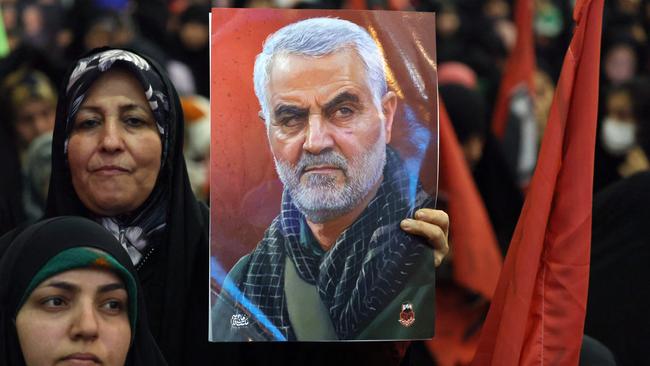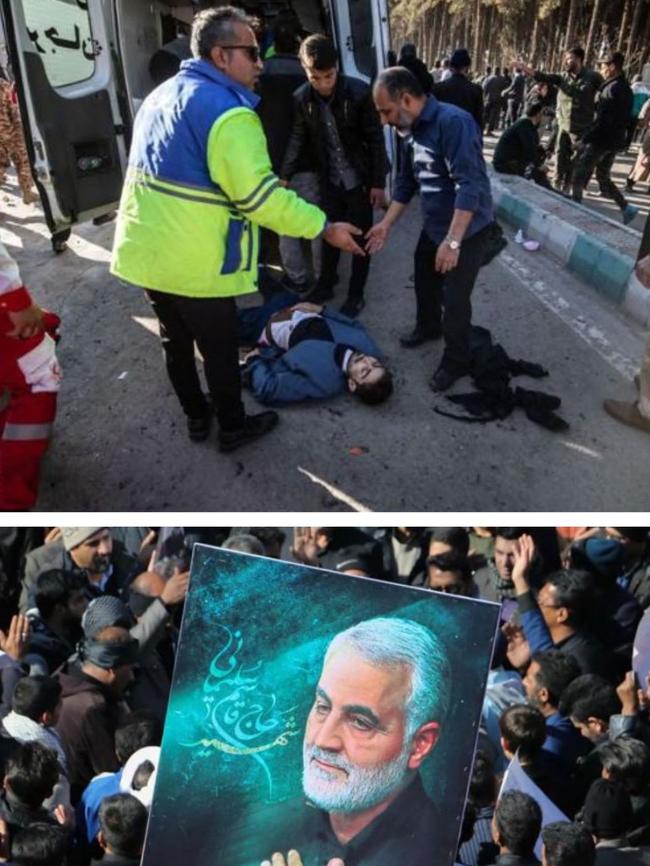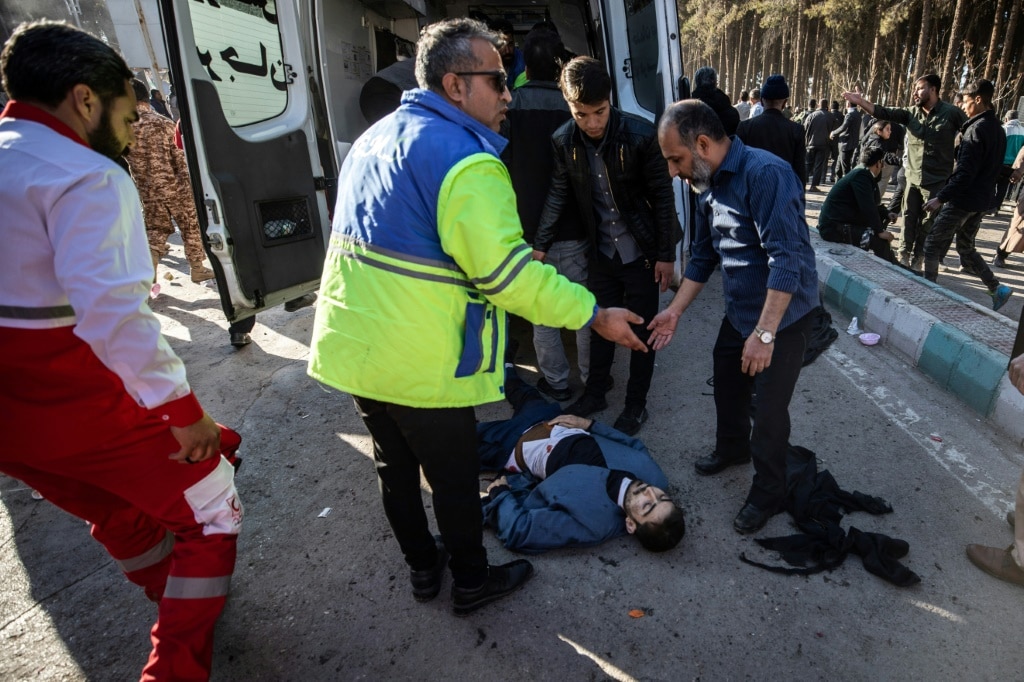Iran twin blasts kill 95 near grave of Revolutionary Guards general Qasem Soleimani
Iranian President blames Israel and threatens revenge after bombs ripped through a crowd commemorating Qasem Soleimani four years after his death in a US strike.

Twin bomb blasts killed 95 people in Iran on Wednesday, ripping through a crowd commemorating Revolutionary Guards general Qasem Soleimani four years after his death in a US strike, state media reported.
At least 211 others were wounded by the blasts near the tomb of Major General Soleimani.
Iran’s supreme leader Ayatollah Ali Khamenei blamed “evil and criminal enemies” of the country for the attack and vowed a “harsh response.”
The two explosions — labelled a “terrorist attack” by state media and regional authorities — came amid high Middle East tensions over the Israel-Hamas war in Gaza and the killing of a Hamas senior leader, Saleh al-Arouri, in Lebanon on Tuesday.
Iranian President Ibrahim Raisi condemned the “heinous crime” and threatened Israel with revenge.
“We warn the Zionist entity - you will pay a heavy price for the crime in Kerman, we will make you regret it. Operation ‘Al-Aqsa Flood’ continues - and its end will be the end of the Zionist entity,” he said.
The commander of the Revolutionary Guards’ Quds force blamed Israel and the US, saying: “The day will come when the United States will be forced to pay for its support of Israel.”
Israel refused to comment on whether it was responsible for the blasts but the US State Department declared it was “ridiculous” to suggest either country was responsible.
A senior White House official said the attack had the hallmarks of an ISIS attack.
“It does look like a terrorist attack, the kind of thing ISIS has done in the past, and that’s our ongoing assumption at the moment,” they told reporters.
The unclaimed attacks — which sparked fears of a widening conflict in the region — rattled global markets where oil prices jumped more than three per cent.
The blasts, about 15 minutes apart, struck near the Martyrs Cemetery at the Saheb al-Zaman Mosque in Kerman, Soleimani’s southern hometown, as supporters gathered to mark his killing in a 2020 US drone strike in Baghdad.

Iran’s official IRNA news agency initially reported 103 people were killed while state television said 211 were wounded, some in critical condition.
Health minister Bahram Eynollahi later revised the toll, saying: “The exact number of the people killed in the terrorist incident is 95”.
He said the reason for the earlier figure of 103 was that some names “were wrongly registered twice”.
Three paramedics who rushed to the scene after the first explosion were among those killed, said Iran’s Red Crescent.
IRNA said the first explosion took place around 700 metres from Soleimani’s grave while the other was around one kilometre away.
Tasnim news agency, quoting what it called informed sources, said “two bags carrying bombs went off” and “the perpetrators … apparently detonated the bombs by remote control”.
Online footage showed panicked crowds scrambling to flee as security personnel cordoned off the area.
State television showed bloodied victims lying on the ground and ambulances and rescue personnel racing to help them.
“We were walking towards the cemetery when a car suddenly stopped behind us and a waste bin containing a bomb exploded,” an eyewitness was quoted saying by the ISNA news agency.
“We only heard the explosion and saw people falling.”
By nightfall, crowds returned back the Martyrs Cemetery in Kerman chanting: “Death to Israel” and “Death to America”.
In Tehran, thousands gathered at the Grand Mosalla Mosque to pay tribute to Soleimani.
“We condemn today’s bitter terrorist incident … I hope the perpetrators of the crime will be identified and punished for their actions,” Soleimani’s daughter, Zeinab, said.
Soleimani headed the Quds Force, the foreign operations arm of the Islamic Revolutionary Guards Corps, overseeing military operations across the Middle East.
The twin blasts were denounced by the European Union, Russian President Vladimir Putin, Irad and Jordan.
“The EU condemns in the strongest terms today’s bombing … This act of terror has exacted a shocking toll of civilian deaths and injuries,” an EU statement said.
“The killing of peaceful people visiting the cemetery is shocking in its cruelty and cynicism,” Putin wrote to Raisi and Khamenei.
Iraq — where some 3,000 people gathered in Baghdad Tuesday to commemorate Soleimani — said it was ready to help “to alleviate the impact of this cowardly criminal act”.
The blasts came a day after Hamas number two Saleh al-Aruri — an Iran ally — was killed in a strike, which Lebanese officials blamed on Israel, on a southern Beirut suburb that is a stronghold of Iran-backed armed group Hezbollah.
Wednesday’s bomb blasts were Iran’s deadliest since a 1978 arson Cinema Rex attack in the southwestern city of Abadan, which killed at least 377 people, according to AFP archives.
Iran has long fought a shadow war of killings and sabotage with arch enemy Israel and also battled various jihadist and other militant groups.
In September, the Fars news agency reported that a key “operative” affiliated with the Islamic State group, in charge of carrying out “terrorist operations” in Iran, had been arrested in Kerman.
In July, Iran’s intelligence ministry said it had disbanded a network “linked to Israel’s spy organisation” which had been plotting “terrorist operations” across Iran, IRNA reported.
The alleged plots included “planning an explosion at the grave” of Soleimani, it said.
Soleimani, whom Khamenei years ago declared a “living martyr”, was widely regarded as a hero in Iran for his role in defeating IS in both Iraq and Syria.
Long seen as a deadly adversary by the United States and its allies, Soleimani was one of the most important powerbrokers across the region, setting Iran’s political and military agenda in Syria, Iraq and Yemen.
AFP







To join the conversation, please log in. Don't have an account? Register
Join the conversation, you are commenting as Logout